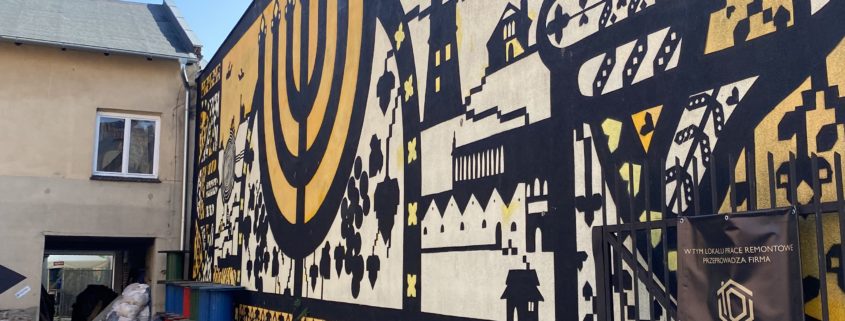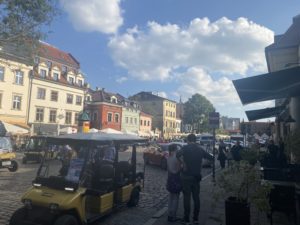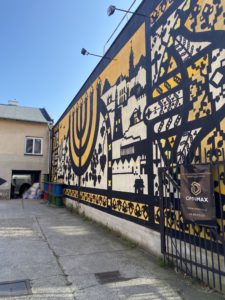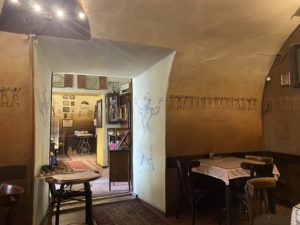“Jewish-themed Restaurants,” the Jewish Mafia, and Other Reasons Why I’m Upset
By Max Ditchek Goldberg
Preface: I first began writing this piece on October 8th, 2021, around a month prior to today’s date. Since the second I stepped foot on Polish soil, I was severely underprepared for the demanding and catastrophic emotional journey that the last two months have taken me on. I came here as a student, but also as a crusader. This was a personal endeavor, and as much as I attempted to prioritize the academic reasons for choosing Poland to continue my studies, I knew I would never be able to. Regardless of the metaphorical armor I put on in preparation, it was not enough. I have never felt more sorrow, more helplessness, and most notably, more anger than I have here. That is, after all, my typical instinctual reaction to anything unpleasant. I am simply an angry person, and there have been plenty of experiences in Poland that have made me furious. So as any good student would do, I wrote about it. I felt that there were crimes gone unpunished, that justice had yet to be done, and once I found something and somebody I could direct my anger towards, I did not hold back. I can only assume that, for my fellow classmates, I was miserable to share a room with. My language was strong, accusative, and to an extent controversial. I do not apologize for any of this, and I stand by what was initially written in this essay. However, there have since been many important changes to it. This essay, like Poland itself, is divided up into two parts because there is no single Polish history. There are Polish dilemmas, there are Jewish dilemmas, and there is some odd shared history mixed into it all. It has to be this way, otherwise, the picture is incomplete. There is no specific order to it, but perhaps you will be able to tell which parts of the writing are original, and which I felt obliged to add, due to external pressure or simply minor changes of heart. You might be confused at some points, but I was too when I wrote it, and frankly still am. You will also be hearing from me today occasionally, perhaps contradicting what was originally said or just supplementing it. This may interrupt the flow of the essay as well, but it is reflective of the turbulent nature of my thought process, an ongoing struggle. With that said, here is how it originally began…
Antisemitism is not going anywhere anytime soon. It is an unfortunate truth that I, like so many Jews across the world, understand far too well. Now, if you have prematurely checked out and already determined that this article is just another Jew baselessly complaining about social treatment, you and 74% of Poland have a lot in common. In a 2019 global survey conducted by the Anti-Defamation League, a historic and sturdy Jewish advocacy NGO, 74% of Poles interviewed said that Jews still talk too much about what happened to them in the Holocaust, or Shoah. 48% stated that Jews think they are better than other people, and 50% stated that Jews only care about their own kind. I consider these sentiments antisemitic. Hatred towards Jews has been much more explicit throughout history, correct? The Spanish inquisition, European pogroms, the expulsion of Jews from Arab lands, the Dreyfus affair, Stalinism, the Shoah, and so forth. I am writing this very article from Poland after all, which as of 2015, has had a far-right government in power, fueled by white nationalist supporters. Antisemitic ideology is the foundation of white nationalism, an ideology Poland and neighboring countries (one in particular) are historically familiar with. If Jewish symbols are burned at mass gatherings across Central Europe to this day, and Jewish homes and businesses vandalized, why then focus on such “banal” antisemitic attitudes or behaviors?
There is an odd malicious power that resides within the contemporary attitudes of Europeans; stereotypes, bias, and the like. Such sentiments are more widespread than “violent antisemitism”, or newsworthy acts of hostility, such as the physical assaults of Jews on the street. These commonly found prejudice, as shown by the ADL survey, are merely demonstrative of a seemingly eternal variety of means of discrimination towards Jews for antisemites to choose from. In my 3 months of studying in Poland, I was fortunate enough to experience one particular manifestation of this banal antisemitism myself. I simply had to write about it, solely because of how odd I find it. The face of contemporary Polish banal antisemitism is cultural appropriation.
The opening paragraphs were originally more strongly-worded. It was written after one particular experience that you will soon read about, which was the culmination of blood-boiling observations I had made during my travels across the country. This experience was the prime example of what I saw as a disservice and disrespect to the memorialization of the Shoah and Polish Jews on behalf of the Polish people. I had not seen Polish Jews up until this point, only historic Jewish cemeteries that had been vandalized first by the Nazis, then the Soviets, then average Poles. I had not visited Jewish services in a Polish synagogue, just decrepit, abandoned, or “replaced” temples. I was overwhelmed when I heard we had a planned visit to Krakow’s so-called Jewish district, Kazimierz, and that we were set to meet local Jews and see how they persevered despite the Shoah. You can’t quite imagine how severe my disappointment was, as I haven’t told you what happened yet, but perhaps my emotions were so strong I failed to write with rationality, leading to my eventual revision of this essay. Let’s continue…
At home in the United States, cultural appropriation targets certain communities more than others, but I had never experienced it per se because of the contrasts in American and Polish Jewish histories. American Jewish history is relatively recent, whereas Jews have been a persecuted minority in Poland for centuries. There were many periodic dark times for Polish Jews. It all culminated in the mid 20th century, but despite this, the Jewish community was historically vibrant here. There were revolutionary Jewish political and religious movements, and new philosophies that began here spread across the world, including among other religions and ethnicities. Most important of all to this story, Jews contributed to the very construction of Poland. Jews first came to Poland as nomadic merchants, which put Poland on the map as an international trading route and brought revenue and economic diversity. Jews were carpenters, glassworkers, doctors, politicians, and scientists. We rejoiced in financial wellbeing alongside Poles (to an extent) and shared the burden in times of economic hardship. Nowadays, there aren’t very many Jews at all left in Poland. 90% of Poland’s Jews were killed during the Shoah, and the country is now home to less than .01% of the international Jewish population. Strangely enough, you wouldn’t be able to tell if you walked through the Kazimierz district in the city of Krakow. Nowhere in Poland is cultural appropriation more explicit than in Kazimierz.
The photo of a busy square was taken in central Kazimierz. In it, we can see the row of “Jewish-themed” restaurants, with paintings of long-bearded and hooked nose Jews holding golden coins lining the walls. We can see tourist carts, charging ridiculous prices to drive mostly other Europeans around and show off the former Jewish ghetto, the Schindler factory, and of course the Auschwitz concentration and death camp.
Remember, cultural appropriation is the inappropriate adoption of elements of one culture by members of another culture for personal gain. When I first stepped into this area of Krakow and learned about it, I saw Holocaust tourism, and what a strange concept it was. I first saw the profiteering and mockery of my culture for selfish economic gain in Kazimierz, the very same place where my ancestors had the worst possible crimes committed against them, while the ancestors of these profiteers witnessed it happen. I could only see Polish people as thieves of my Jewish legacy.
Throughout the district are seven synagogues, dozens of Jewish restaurants, bars, hotels, and street art. Yiddish can be seen spray-painted on the walls of brick buildings, while Klezmer music is played by street musicians. You can eat Israeli hummus while you walk the “historic Jewish district route” and visit important cultural sites, such as the historic Jewish ghetto which the Hollywood movie Schindler’s List depicts, and locations locally where it was filmed. There is one issue, however: none of it is real, and today, none of it is genuinely Jewish.
This is not entirely true. When I wrote that last sentence for the first time, I consciously omitted extremely important and extraordinarily unfortunate details surrounding the dark nature of Kazimierz, because I refused to accept the reality of the situation. I came into Poland, as I previously mentioned, with a predisposition. I spoke with a very threatening one and would speak in dramatic fashion, that I was “out for revenge,” and the like. Perhaps the sight of Poles selling symbols of my faith and adorning their buildings with Jewish
symbols and products to attract tourists who don’t know any better was the final straw. I snapped. After visiting death camps, abandoned religious sites, and Jewish neighborhoods reduced to rubble, I simply snapped. This mockery I saw in front of me was their dismissal of the horrors of the past that I believed each and every one of them had a part in; that they all didn’t just kill the Jews, but were now metaphorically selling their organs. Again, the truth is not so straightforward. I still wouldn’t consider Kazimierz to be genuinely Jewish, but that doesn’t mean it isn’t Jewish. I allowed my emotions to cloud my judgment. I wrongly chose not to talk about my own involvement, or rather, my own people’s involvement. I chose not to talk about what was referred to during our visit by guides as the Jewish mafia, but we’ll get to that in a second. Where were we…?
The synagogues, former Jewish temples of worship, now mostly serve as pay-to-enter museums, attracting tourists from all across European countries where Jews used to reside. There are no Kosher butcher shops in Kazimierz anymore because there is no visible Jewish community to serve. There are just souvenir shops and market stalls run by Poles selling Menorahs, Stars of David, figurines of bearded Zydzi, and even Nazi memorabilia to non-Jew tourists. Some bars were once temples or Yeshivas, with the gorgeous religious murals still barely hanging on the walls and a keg where a Torah was once kept. This district is the centerpiece of Krakow tourism, and one of the main sources of tourism income for the country of Poland as a whole. It is a theme park, a tourist trap, and a disgrace.
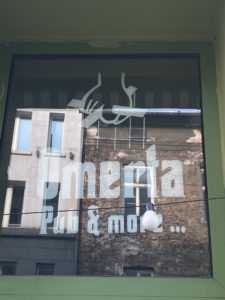
The “Omerta” pub in Kazimierz plays with the Schindler’s List film title, also a symbol used to peddle the antisemitic conspiracy of “puppet masters” or “globalists”
Where we as Jews once lived and schooled, they dared to serve tourists soggy bread and wet fish and call it a “Jewish” bagel with lox. Where we once prayed, they smoke and serve “Jewish” wine, while the Schindler’s List soundtrack plays on in-house speakers for ambiance and effect.
Let me be clear: The businesses mentioned, run and staffed by Poles, are an insult and indeed examples of “passive” antisemitism. It is my responsibility to tell you, however, that many of the buildings these businesses are located in are Jewish-owned. By Jewish-owned, I mean under the control of one Jew, Tadeusz Jakubowicz, who is the president of the official Jewish Community of Krakow. This entity is, in essence, the recognized authority/representation for Jews within the city, and therefore is the city government’s official source of information and input from the “Jewish Community of Krakow.” And, as has been widely reported across news outlets and Jewish media sources, the official Jewish Community in Krakow is controlled by Jakubowicz and his closest family members. Previous journalism on the upsetting state of Kazimierz also highlights how Jakubowicz’s Jewish community and Jewish advocacy groups across the world have been at odds for decades since the fall of communism and the restoration of freedom to practice religion in Poland. In 1997, the national government returned former Jewish communal properties to the official Jewish community, which was at the time run by Jakubowicz, one of the incredibly few Jews who remained in communist Poland. He was, therefore, able to take advantage of the transition financially. Five of the seven synagogues previously mentioned are owned by the official Jewish Community, and the reason there are not many Jews praying in them is actually because of frustrating legal disputes between Jakubowicz and the local Jews that prayed there, leading to their eventual forced removal from these places of worship. Whether it was due to complex infighting amongst religious Jews (I won’t go into detail because of the painful emotions it brings up), or simply motivated by pure financial greed to generate tourism revenue, I couldn’t understand Jakubowicz’s intentional disintegrating of Krakow’s genuine Jewish identity. In the last paragraph, I allude to a certain bar that was surrounded by controversy after settling in a former religious institution and removing the area where the holy ark was formerly located to put in a door. The bar, known as Hevre, is Jewish-themed and run by Poles. But the building is owned by the official Jewish Community of Krakow and, therefore, controlled by Jakubowicz. I knew this when I first wrote the piece, but I chose not to include it. Why? To be honest, I still haven’t come to any conclusions, just that I know I began to tear up when I first opened the blank page on my computer. Perhaps I didn’t want to accept it, or that I emotionally couldn’t handle the battle. In the midst of all of this conflict and the Jewish fight for reconciliation in Krakow, we were fighting amongst ourselves? Perhaps I was simply reacting to what I saw, as I detailed in the closing segments of the original essay that follow…
Another picture attached in this piece with dancing Jews on the wall was taken inside one such restaurant in the city of Lublin, a less offensive but equally as effective demonstration of this cultural appropriation I speak of. I decided to buy a loaf of Challah, a traditional Jewish sweet bread, that I saw on display here. The staff member corrected my pronunciation. “Chalka, it is traditional Polish bread,” she said. No, it isn’t. In Wrocław, a Jewish-themed cafe called Sarah lets customers connect to its wireless network, Jewish_WiFi, using the password “Jew1sh.” In Krakow, I met with several local Poles for meals throughout the city. One nice couple took me to a “Jewish” restaurant they said they frequent, and I was too polite to decline. While I was there, I would softly mention my objections to the restaurant and its presentation, including some descriptions of menu items, and the fact that the hostess shouted “Shalom” towards us when we first arrived. Their response was something about how beautiful Jewish culture was and that they’re glad Jews are once again safe and doing business in Poland. The next day I met with a young Polish man. He was kind, but unfortunately, I could not ignore the comments he made whilst we discussed the sensitive topic. He spoke about his negative feelings towards the modern Jewish community and Israel, and how he’d wish they would stop blaming Poland. He also didn’t hesitate to discuss certain local conspiracy theories, ones that I couldn’t help but notice were strikingly similar to antisemitic conspiracies used among nativists and nationalists back home.
Please, do not confuse this crime of false memorialization with an act of sincere remembrance. This environment perpetuates the horrendous narrative that the previous ethnic conflicts of the 20th century are gone, that Jews and Poles persevered together, and that Polish and Jewish culture are one and the same, a beautiful mixing pot. It perpetuates the idea that Jews as a culture prevailed in Poland, and we most definitely did not. By and large, the Polish government and people have long tried to distance themselves from the crimes committed against the Jews during the Shoah, deflecting blame or claiming identical victimhood. International and domestic Jewish advocacy groups are put in a particularly tricky spot. Will there only be an increase in already strong antisemitic views among Poles if Jewish activist groups were to close or rearrange the management of businesses on former Jewish property? Absolutely, but then what do you expect us to do? Allow this profiting off of our culture to continue?
This is where I struggle to find the right words to accurately express how I feel. It only tells me that I, after 3 generations, have yet to be free of the clutches of the Shoah’s legacy. This has been an unfortunate take away from my time in Poland. For fashion and wine studies, feel free to study abroad in France or Italy. Meanwhile, I have fallen deep into a Jewish identity crisis. My community, the global Jewish community, but also the Polish nation, continue to suffer and feel the effects of what happened 80 years ago, and that makes me angry. I am angry with Germany, Hungary, Austria, Russia, and Poland. I am angry with Tadeusz Jakubowicz. I wonder what his reasoning was for committing such, let’s call them, questionable decisions. Does he see it as the money he deserves as compensation? His family somehow survived the Shoah and stayed put during communism, while most others were killed or fled. It is truly a shame that this is happening, but I see it as a direct result of trauma, caused by antisemitism, that has been passed on from generation to generation. It was only natural for Jews to become sheltered and even paranoid after the Shoah. My own grandfather held grudges against certain peoples within Europe, for what he saw as centuries of ill-treatment, and therefore began to express his Judaism more explicitly as a sign of resistance. Others in my extended family hid their Judaism, and even refused to practice in private so as to not pass on what they saw as a curse onto future generations. This was all thrown on me within a short period of time, and I became so upset. I needed something to change immediately, I needed to address Kazimierz, but understand that I do not feel “good” about what I originally wrote, nor about the anger within the text that you could feel, targeting the country I was in and the people who now lived here. I do not feel accomplished, if anything I feel more helpless. Here is how the essay originally ended…
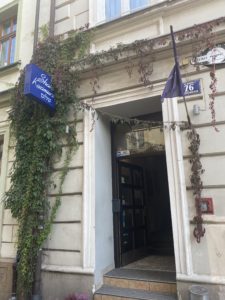
The hotel Shalom Kazimierz, not owned by Jews, with a dollar sign logo barely visible in this photo above its front door
Perhaps this experience was such a shock to me because I come from a very Jewish space, or rather, a modern American Jewish space. The county I grew up in back in California’s Bay area is 6th in the number of Jewish citizens across the United States. Many of whom, including my late grandfather, are descendants of holocaust survivors, and who still hold negative views of the countries in Central and Eastern Europe they feel failed to protect their lineage. Perhaps this sentiment had rubbed off onto me, and I carried it with me like a chip on my shoulder throughout my journey across Poland. My accusations of antisemitism, however, shouldn’t be met with denial or dismissive attitudes, which has unfortunately been the case during my discussions here. The consistent reaction from Poles to calls for change from international Jewish communities has been to double down. Last year, the Polish federal government introduced a bill to end nationally-sponsored restitution programs aimed at returning lost property to the Polish Jews it once belonged to. After multiple attempts since the end of communism, the bill passed with bipartisan support. You read that correctly. There would be no more “apologies”. How can I as a Jew, the descendant of those murdered within Poland, have any respect for a country that continues to pretend it was a liberator to my people all while it spits on their graves? The current administration is a far-right party with dwindling support. It is not necessarily representative of Poland as a whole, but it is emblematic of the attitude that many Poles have time and time again demonstrated towards the Jewish community that once thrived here: your suffering is only worthy of remembrance if we can benefit from it, or if it isn’t an inconvenience.
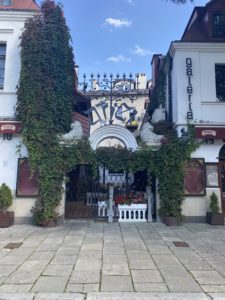
The Jewish-themed restaurant Ariel uses Hebrew font at its entrance and on its menu, with Jewish cartoons lining the walls inside
There is no single Polish history. There are Polish dilemmas, there are Jewish dilemmas, and there is some odd shared history mixed into it all. I understand this essay was difficult to read, but it was my best attempt at providing the edges of a puzzle to people who haven’t had the chance to see what I have seen here. I can’t end the essay with such a strong statement, as it delegitimizes my claims but also isn’t complete. I still believe it to be true, and I don’t want to pretend it is my responsibility for making amends, I don’t believe that is my duty as Jew. Why should I apologize for anything? I know that there is still much I do not know, and in my quest to find answers here I overheated and I shut down. I stood too firm on the ground that I sunk into the mud. Perhaps this is how Jakubowicz feels, or how the local Polish business owners feel, or even how citizens in 1930’s Germany felt. When we are threatened, we react, and we lash out. This essay was first only about Kazimierz, but then I couldn’t do the story justice without discussing antisemitism. I couldn’t talk about antisemitism without the legacy it left, and I couldn’t talk about that legacy without going back to Kazimierz, only this time from a different perspective. I am not going to conclude this with a meaningless argument for the acknowledgment of this superficial idea of “two sides” to every story because I know this is stupid. “Sides” implies two even shapes, two equal shares of the story. There are always multiple levels, sure. Understand that each of these levels of the story will teach you something different, and in some cases, it is something you do not want to hear. Poles must hear the tragedy of the Jews, and accept it. I, as a Jew, need to accept the truth, even when it hurts like hell, like pain so sharp it is indescribable because it is something eternal. I am not going to end this essay on a positive note either. That would be a sham. I am still angry and upset, that has not changed.
References:
-ADL Global 100 Antisemitsm Index: https://global100.adl.org/country/poland/2019
-Noted from Poland on Restitution Law: https://notesfrompoland.com/2021/08/30/polands-new-restitution-law-explained/
-Times of Israel coverage on Krakow Jewish controversy: https://www.timesofisrael.com/a-clash-between-jews-in-krakow-highlights-growing-acceptance-of-chabad-in-europe/
– Jewish Telegraph Agency’s coverage on the Krakow Jewish Community:

